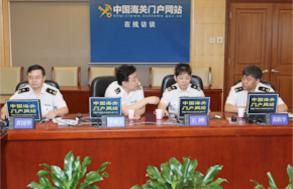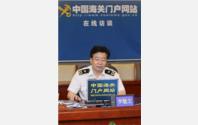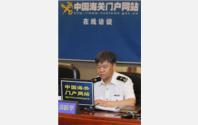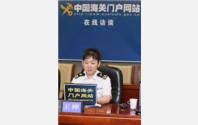 Online Interview
Online Interview
Topic: China Customs 20 Measures to Support Steady Foreign-Trade Growth
Time:10:30 AM (Fri) May 23, 2014
Special Guests:Li Kuiwen, Deputy Director General, GACC Department of Policy Research; Miao Yuexue, Deputy Director General, GACC Department of Customs Control and Inspection; Huang Guohua, Associate Counsel, GACC Department of Statistics
China Customs 20 Measures to Support Steady Foreign-Trade Growth
[Miao Yuexue]: Good question. First I’d like to point out that no fee is charged for customs inspection. Article 28 of the Customs Law stipulates as follows: “For Customs inspection on goods, the consignee of the imported goods or the consignor of the export goods shall be present on site and responsible for moving the goods and opening and resealing the package”. For import and export enterprises, they can arrange personnel to perform this obligation by themselves, or purchase relevant service from a third party service enterprise such as a terminal company. In the second case, during the customs inspection, import and export enterprises will have to pay fees to the third party service enterprise; in some place, this kind of fees are simply called as “customs inspection fees”. In recent years, more and more customs at different ports have been equipped with large container-inspection equipment; the inspection process has been optimized and thus the inspection fees paid to the third party service enterprise are cut down. Besides, GACC is cooperating actively with competent authorities for industry and commerce and for price control to severely crack down frauds in the name of customs. 05/23/2014 11:19:19
[Miao Yuexue]: What’s more, there is also the possibility that a third party illegally collects so-called “inspection fees” in the name of customs. Therefore, we take initiative to work with competent authorities for industry and commerce and for price control to severely punish people committing these frauds. 05/23/2014 11:20:52
[Miao Yuexue]: Ever since 2012, GACC has made greater effort to reduce fees for export or import procedures and canceled 4 items of administrative charges and fees for printing “three forms”, namely, the verification sheet for export proceeds in foreign exchange, import verification sheet and export declaration form. On this basis, as required by the central government, GACC has focused on reducing business services relevant to import/export procedures and their corresponding charges. We will further cancel or regulate some fees according to laws and regulations, and standardize relevant charges by strictly following the prescribed charging standards and scope. Next, GACC will strengthen its guidance for intermediary agencies like brokers associations, and drive them to establish a forceful self-disciplinary mechanism within the industry, so as to help brokerage business to operate in a standard and professional way and promote supervision over the brokerage. 05/23/2014 11:21:09
[Netizen]: I have a question about promoting the cooperation between Customs and Bureau of Inspection and Quarantine in “Three Ones”. It’s known that declaration at the place of origin is required for exported goods. Then how do you realize the one-time inspection? Will Customs work with Bureau of Inspection and Quarantine to inspect the factory of origin? Or will the Bureau of Inspection and Quarantine change the rule and no longer require declaration at the place of origin? 05/23/2014 10:34:50
[Miao Yuexue]: Thanks a lot for your attention on the “Three Ones”. As you’ve mentioned, Customs and Bureau of Inspection and Quarantine may differ in their procedures, time and requirements for inspection of exported goods, so we are currently coordinating with each other by adopting the “Three Ones”. Recently, GACC has negotiated with General Administration of Quality Supervision, Inspection and Quarantine on further promoting the “Three Ones” throughout the country, and we will also find proper opportunity to expand the cooperation between Customs and Bureau of Inspection and Quarantine in “Three Ones” to our export procedures. Thank you! 05/23/2014 11:23:10
[Netizen: Sanghaiyiganing]: Is it possible for Customs to lower the inspection rate? It is rather tough for us enterprises. Our cargos have been inspected three times in succession and we passed each inspection. And today we were inspected again.
[Miao Yuexue]: Thanks for your question. Your cargos have passed three inspections in succession. That means your enterprise makes true declaration and is credible. So the Customs will reasonably adjust the rate for random inspection of your enterprise according to your actual risk level. In fact, the Customs have worked on enhancing the pertinence and effectiveness and the overall efficiency of inspection, so that we can save time and money for law-abiding enterprises. Recently we have adopted measures like inspection by category and divided inspection; so as to comply with logistic principles and reduce the impact of inspection on overall logistics. 05/23/2014 11:27:40
[Netizen]: The situation this year is so bad. Do you think we can meet the target of 7.5 for growth rate? 05/23/2014 11:06:46
[Huang Guohua]: China’s foreign trade is now in a phase with shifting growth rate and has fallen back into a moderate-to-low range of growth rate from the range of high growth rate in the past. Generally speaking, our foreign trade is faced with new challenges and opportunities. These challenges can be summarized into four trends: transferring, weakening, withdrawing and adjusting. “Transferring” refers to the accelerated transfer of manufacturing industries to the surrounding countries in the Southeast Asia; consequently, the market share of our labor-intensive products in Europe, America and Japan has been declining continuously, while the share of products produced by Vietnam, Mexico, India and Bangladesh in the three markets are climbing up. “Weakening” means the growing costs for production factors like labor has weakened the competitiveness of China’s labor-intensive products for export. In recent years, the minimum wage standards in different parts of China have all kept growing, so have the integrated operation costs for enterprises including labor, financing, land, and raw materials, and restrictions from resources and environment is more obvious; therefore, the competitive advantages of our traditional industry are weakened. Next, “withdrawing” refers to the fact that some developed countries have withdrawn part of their manufacturing business from China to their homelands because they want to stimulate the economy and create jobs in their own countries. Consequently, foreign investment is cooling down. In the first four months of this year, the amount of foreign investment actually employed in China’s manufacturing industry was USD 14.5 billion, with a year-on-year decrease of 11.4%. “Adjusting” means that China is experiencing a period of adjusting economic structure, transforming production modes and restricting production capacity. The demand for some bulk commodities is declining and prices of some products have been adjusted. From the beginning of this year, China has made greater effort to adjust economic structure and actively close down outdated production facilities. Our economy is growing at a slower pace, and the global supply of some bulk commodities has exceeded the demand. In the first four months this year, China’s overall import price has dropped by 3.8% and the monthly import price has already kept falling for 26 months on a month-on-month basis. These are challenges for us now; as for the potential opportunities, we can summarize them into another four words: promoting, stabilizing, depreciating and improving. First, “promoting” comes from a series of measures by China to promote the steady growth of foreign trade and boost the confidence of our enterprises. On May 4, the State Council released the Several Opinions on Promoting the Steady Growth of Foreign Trade and General Administration of Customs also announced 20 supporting measures, in order to restore enterprises’ confidence and ensure the steady growth of foreign trade. According the monthly follow-up survey by GACC on nearly 2,000 export and import enterprises, in this April, the indicator of export confidence reached 49.6, the highest since June, 2012. Second, “stabilizing” means major economic entities in the world are recovering and stabilizing. This April, the Markit composite purchasing managers' index(PMI)in euro zone increased to 54 from a 53.1 in March, reaching a new peak ever since May 2011. Meanwhile, the consumption demand of European consumers also grew. In March, the retail sales of EU and euro zone increased by 0.3%monthonmonth, with respectively a 1.6% and 0.9% growth year on year. This April, the PMI for U.S. manufacturing industry had an initial value of 55.4 and the industry has been expanding. American consumer confidence index for this April had climbed up to 84.1, the highest ever since July, 2013. As for “depreciating”, it refers to the recent depreciation of RMB exchange rate after its appreciation for many years, which shows a trend of bi-directional fluctuation. Actually a depreciating RMB exchange rate is to the favor of export. At last, “improving” refers to the improvement in quality and effectiveness. Recently, China has made certain progress in transforming modes of development, adjusting economic structure, enhancing effectiveness, exploiting potentiality and improving integrated competitiveness. Based on our calculation, the quality index of China’s foreign trade development was 65.7 in 2013, with a 3.6 increase from 2012. In a word, we can see it is not impossible to achieve the yearly target of a 7.5% growth; all we have to do is to make greater effort. 05/23/2014 11:28:53
[Netizen]: Would you like to give us a detailed introduction to these policies announced this time? 05/23/2014 10:42:00
Quick Links









